人教版九年级下册 Unit14 I remember meeting all of you in Grade7. SectionA 1a-2d 课件(共24张PPT)
文档属性
| 名称 | 人教版九年级下册 Unit14 I remember meeting all of you in Grade7. SectionA 1a-2d 课件(共24张PPT) | 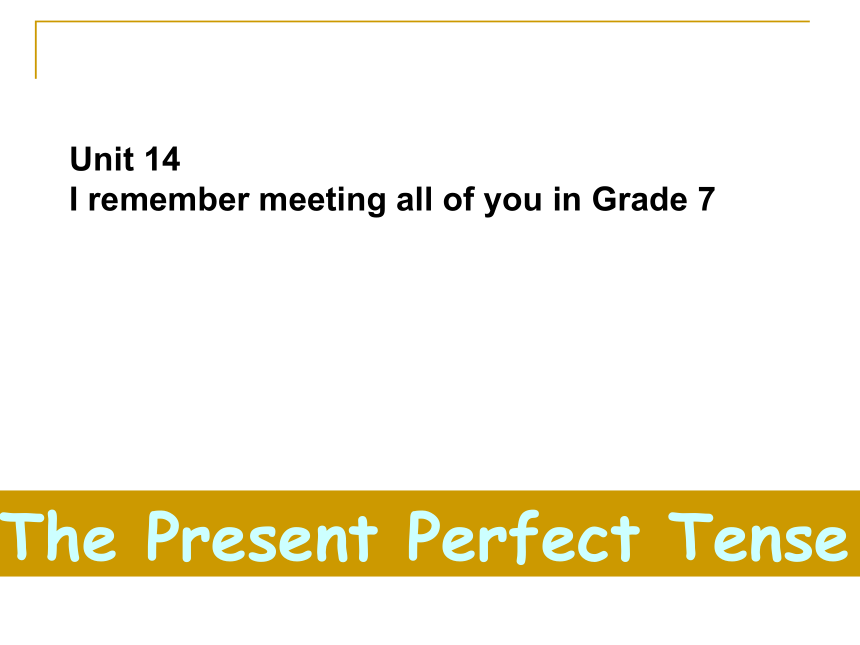 | |
| 格式 | ppt | ||
| 文件大小 | 595.0KB | ||
| 资源类型 | 教案 | ||
| 版本资源 | 人教新目标(Go for it)版 | ||
| 科目 | 英语 | ||
| 更新时间 | 2023-03-21 18:50:20 | ||
图片预览

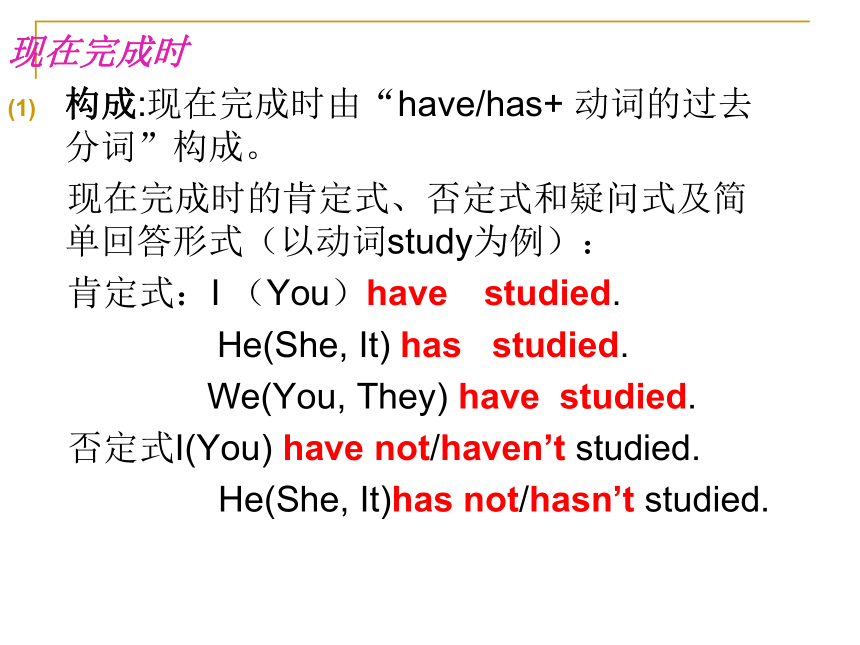
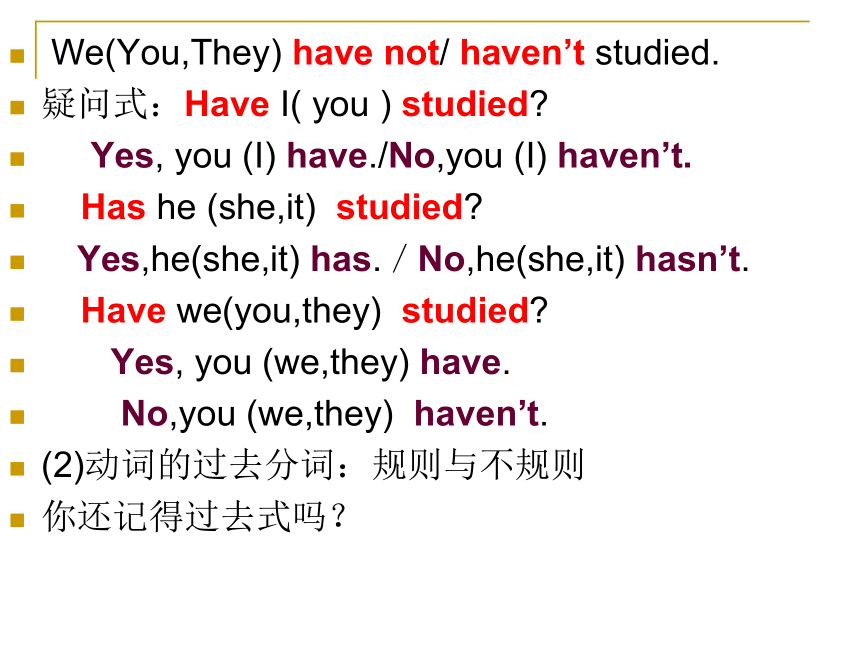

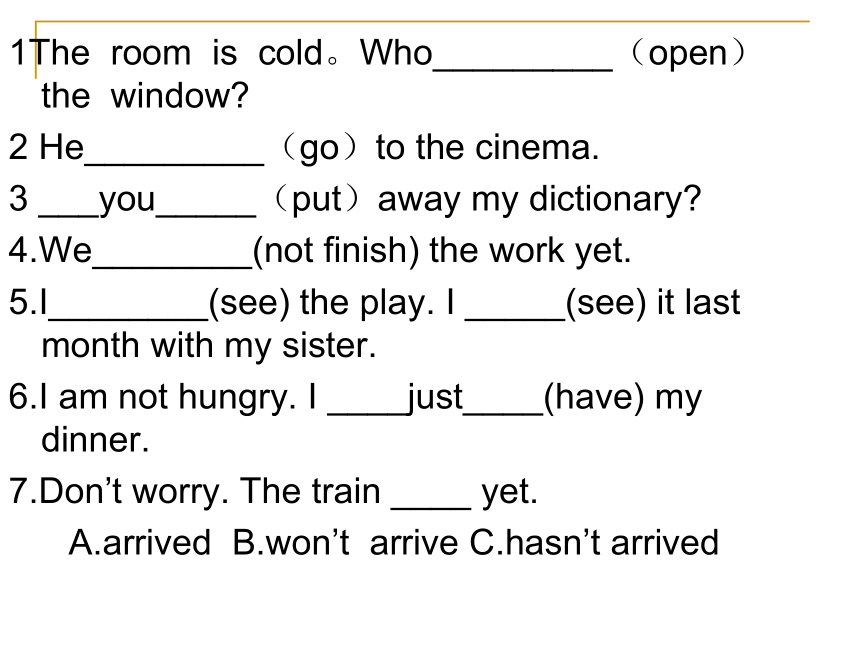
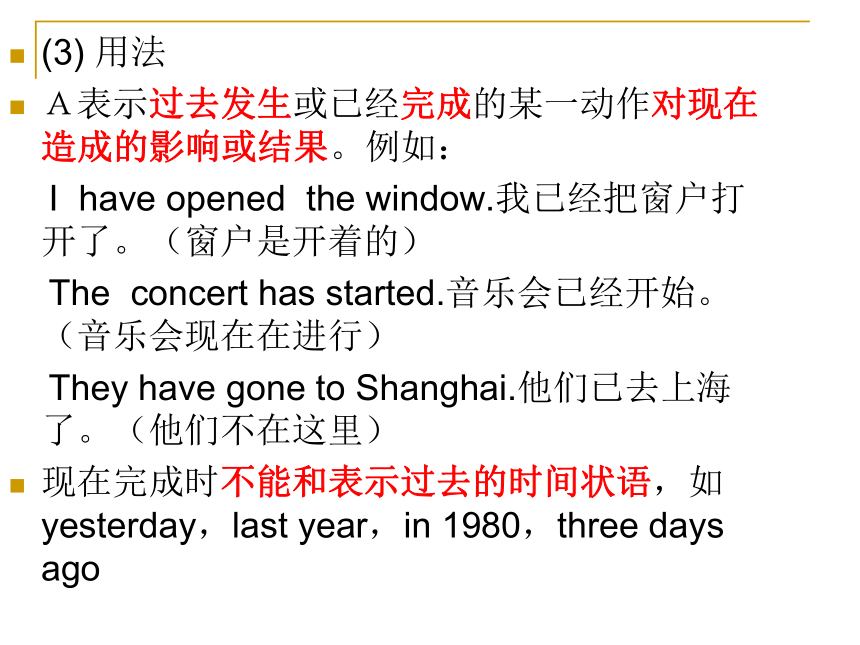
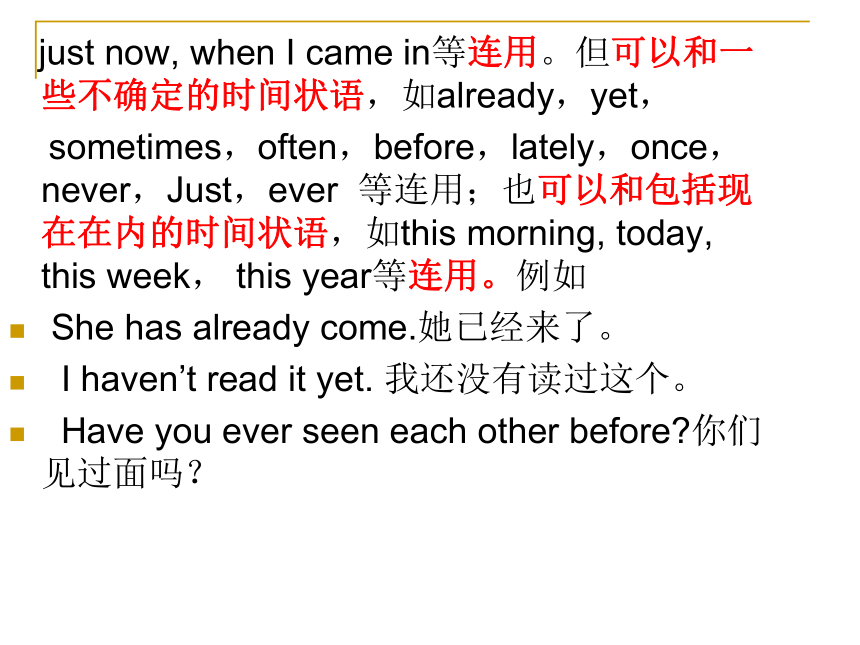

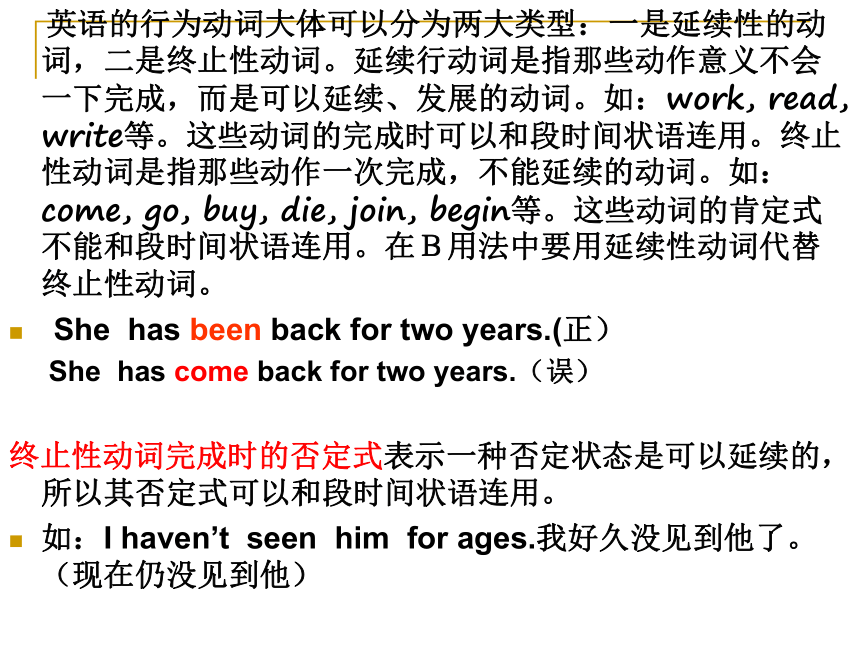
文档简介
(共24张PPT)
The Present Perfect Tense
Unit 14
I remember meeting all of you in Grade 7
现在完成时
构成:现在完成时由“have/has+ 动词的过去分词”构成。
现在完成时的肯定式、否定式和疑问式及简单回答形式(以动词study为例):
肯定式:I (You)have studied.
He(She, It) has studied.
We(You, They) have studied.
否定式I(You) have not/haven’t studied.
He(She, It)has not/hasn’t studied.
We(You,They) have not/ haven’t studied.
疑问式:Have I( you ) studied
Yes, you (I) have./No,you (I) haven’t.
Has he (she,it) studied
Yes,he(she,it) has./No,he(she,it) hasn’t.
Have we(you,they) studied
Yes, you (we,they) have.
No,you (we,they) haven’t.
(2)动词的过去分词:规则与不规则
你还记得过去式吗?
请用两个单词分别写现在完成时的肯定句,否定句和疑问句。
I have written my postcard.
I haven’t written my postcard.
Have you written your postcard
Yes, I have. / No, I haven’t.
1The room is cold。Who_________(open)the window
2 He_________(go)to the cinema.
3 ___you_____(put)away my dictionary
4.We________(not finish) the work yet.
5.I________(see) the play. I _____(see) it last month with my sister.
6.I am not hungry. I ____just____(have) my dinner.
7.Don’t worry. The train ____ yet.
A.arrived B.won’t arrive C.hasn’t arrived
(3) 用法
A表示过去发生或已经完成的某一动作对现在造成的影响或结果。例如:
I have opened the window.我已经把窗户打开了。(窗户是开着的)
The concert has started.音乐会已经开始。(音乐会现在在进行)
They have gone to Shanghai.他们已去上海了。(他们不在这里)
现在完成时不能和表示过去的时间状语,如yesterday,last year,in 1980,three days ago
just now, when I came in等连用。但可以和一些不确定的时间状语,如already,yet,
sometimes,often,before,lately,once,never,Just,ever 等连用;也可以和包括现在在内的时间状语,如this morning, today, this week, this year等连用。例如
She has already come.她已经来了。
I haven’t read it yet. 我还没有读过这个。
Have you ever seen each other before 你们见过面吗?
B.表示过去已经开始、持续到现在(也许还会继续进行下去)动作或状态,常和表示一段时间状语,如:today, these days, since…,for…,this month, now等连用。
例如:I have studied English for two years.
我学英语已经两年了。
They have lived in Beijing since 1980.
他们自1980年就一直住在北京。
We’ve known each other since we were children.我们从小就认识。
英语的行为动词大体可以分为两大类型:一是延续性的动词,二是终止性动词。延续行动词是指那些动作意义不会一下完成,而是可以延续、发展的动词。如:work, read, write等。这些动词的完成时可以和段时间状语连用。终止性动词是指那些动作一次完成,不能延续的动词。如:come, go, buy, die, join, begin等。这些动词的肯定式不能和段时间状语连用。在B用法中要用延续性动词代替终止性动词。
She has been back for two years.(正)
She has come back for two years.(误)
终止性动词完成时的否定式表示一种否定状态是可以延续的,所以其否定式可以和段时间状语连用。
如:I haven’t seen him for ages.我好久没见到他了。(现在仍没见到他)
1. 现在完成时表示过去发生或已经完成的某一动作对现在造成的影响或结果。(汉语中常用“已经”、“过”、“了”等表达)通常与表示包括现在在内的时间副词 just,already, before, yet, never, ever 等状语连用。例如:
① I have never heard of that before.
② Have you ever ridden a horse
③ She has already finished the work.
④ Have you milked the cow yet Yes, I have done that already.
⑤ I’ve just lost my math book.
助动词have (has) + 动词的过去分词
注:has 用于第三人称单数,have 用于其他所有人称。规则动词的过去分词变化与过去式相同,不规则变化则须单独记忆。
2.现在完成时表示过去已经开始,持续到现在,也许还会持续下去的动作或状态。可以和表示延续的时间状语连用。 如for、since 等引导的时间状语。(注意:句中谓语动词要用延续性动词)
一段时间的表达方法有两种:
for +一段时间 for a year for two weeks for three years
过去的某一时刻, since nine since last week
一般过去时态的时间状语从句
since you came since you got home
注意:for 和since 所引导的时间状语都表示一段时间。
He has been away since last week.
He has been away for one week.
对划线部分提问都用How long
Since
(3) have been (to)和have gone (to)的区别:
★have / has been (to) 表示“曾经到过某地”,说话时此人不在那里,已经回来。侧重指经历。
★have / has gone (to) 表示某人“已经去某地了”,说话时此人可能在路上或已到那里,反正不在这里。
试比较:
He has been to Beijing. 他曾去过北京。
(人已回来,可能在这儿)
He has gone to Beijing. 他已经去北京了。
(人已走,不在这儿)。
一般过去时与现在完成时之比较
1)一般过去时表示过去某时发生的动作或单纯叙述过去的事情,强调动作,和现在不发生关系。而现在完成时表示过去发生的某一动作对现在造成的影响或结果,强调的是现在的情况。
2)一般过去时常与具体的时间状语连用,而现在完成时通常与模糊的时间状语连用,或无时间状语。
◎ 一般过去时的时间状语有:yesterday,last week,…ago,in1980,in October,just now等具体的时间状语。
◎ 共同的时间状语有:this morning,tonight,this summer,before,already等。
◎ 现在完成时的时间状语有:for,since,ever,never,just,already,yet,in past years等不确定的时间状语。
请大家认真分析比较下列各例句:
I saw this film yesterday.
(只说明动作发生在过去。)
I have seen this film.
(强调对现在的影响,电影的内容已经知道了。)
She has returned from Paris.
(她已从巴黎回来了。)
She returned yesterday.
(她是昨天回来的。)
He has been in the League for three years.
(在团内的状态可延续。)
He joined the League three years ago.
( 三年前入团,joined为短暂行为。)
注意:句子中如有一般过去时的时间副词(如 yesterday, last week, in 1960)时,不能使用现在完成时,要用过去时。例如:
(错)Tom has written a letter to his parents last night.
(对)Tom wrote a letter to his parents last night.
瞬间动词可以用于现在完成时,但不能和表示一段时间的状语连用。如可说“He has left.”但不能说“He has left for three years.” 如果要表达“他已走了三年了”可用以下几种表达法:
一、用ago, 使用一般过去时。
He left here three years ago.
二、用“It is +一段时间+since +一般过去时从句 ”
It is three years since he left here.
三、用“ 一段时间+have/ has passed + since + 一般过去时从句”
Three years have passed since he left here.
以上三种表示方法适用于所有瞬间动词。
另外,还可用其它表示方法,但只适用于部分瞬间动词。具体办法是将瞬间动词转化为表延续的动词或者表状态的be+名词/形容词或副词/介词短语等。
1.直接转化成延续性动词
buy catch (get) a cold
borrow come/go /become
have
have a cold
keep
be
2.转换成be+名词
join the army
join the Party
go to school
be a soldier
be a Party member
be a student
3转换成be+形容词或副词
die finish begin
leave fall sleep
close open
be dead
be over
be on
be away
be asleep
be closed
be open
4.转换成 be+介词短语
go to school
join the army
①.我们买这本书三年了。
We have had the book for three years.
②他感冒三天了。
He has had a cold for three days.
We bought the book three years ago.
He caught a cold three days ago.
一般过去时态和现在完成时态可以构成同义句
be in school
be in the army
③自从上星期以来,我就借了这本书。
I have kept the book since last week.
④我成为一个学生两年多了。
I have been a student for over two years.
I borrowed the book last week.
I became a student two years ago.
⑤ Mr Black死了三年了。
Mr Black has been dead for three years.
Mr Black died three years ago.
⑥小明参军半年了。
Xiao Ming has been a soldier for half a year.
Xiao Ming joined the army half a year ago.
⑦我们上了8年学了。
We have been students for eight years.
⑧下课10分钟了。
The class has been over for ten minutes.
一看时间状语。如果句中没有表示过去确切时间的状语,常用现在完成时;如果有,则只能用一般过去时。如:
I have visited the factory.
I visited the factory last year.
二看句首有无疑问词。如果笼统地问人家做过某事了吗(句首无疑问词),常用现在完成时;但进一步询问何时、何地、何原因、用什么方式做那事时(句首有疑问词)就要用一般过去时。如:
-Have you had your breakfast -Yes, I have.
-When did you have it -At seven thirty.
三看句中谓语动词是否为延续性动词。如果表示的动作或状态一直延续到现在,最好选用延续性动词,并使用现在完成时;如果是瞬间动词,则用一般过去时。如:
He has been a league member for two months.
He joined the Youth League two months ago.
注意: 这种用法是以连贯性问答为背景的。否则就需要具体情况具体分析。如:
How many words have you learned by heart
How did you learn them by heart
( )1.You’ve never seen such a wonderful film before, _______
A. haven’t you B. have you C. do you D. don’t you
( ) 2. —I have watched the game.
—When ____ you ____ it
A. have; watched B. do; watch C. did ;watch D. will; watch
( )3. Mr. Green ____ in China since five years ago.
A. lived B. has lived C. lives D. is going to live
( )4. His grandma ______ for two years.
A. died B. has died C. was dead D. has been dead
B
C
B
D
( )5. –Where is Han Mei now
- She ____ to Shanghai. She will be back in two days.
A. has gone B. has been C. goes D. had gone
( )6. -_____ you ____to the United Stated
- No, never, but I went to Canada a few years ago.
A. Have; been B. Have; gone C. Did; go D. Do; go
( )7. You haven’t changed your mind,_______
A. do you B. are you C. have you D. did you
( )8. How long have you _____ the football team of
the school
A. played B. been at C. joined D been on
A
A
C
D
The Present Perfect Tense
Unit 14
I remember meeting all of you in Grade 7
现在完成时
构成:现在完成时由“have/has+ 动词的过去分词”构成。
现在完成时的肯定式、否定式和疑问式及简单回答形式(以动词study为例):
肯定式:I (You)have studied.
He(She, It) has studied.
We(You, They) have studied.
否定式I(You) have not/haven’t studied.
He(She, It)has not/hasn’t studied.
We(You,They) have not/ haven’t studied.
疑问式:Have I( you ) studied
Yes, you (I) have./No,you (I) haven’t.
Has he (she,it) studied
Yes,he(she,it) has./No,he(she,it) hasn’t.
Have we(you,they) studied
Yes, you (we,they) have.
No,you (we,they) haven’t.
(2)动词的过去分词:规则与不规则
你还记得过去式吗?
请用两个单词分别写现在完成时的肯定句,否定句和疑问句。
I have written my postcard.
I haven’t written my postcard.
Have you written your postcard
Yes, I have. / No, I haven’t.
1The room is cold。Who_________(open)the window
2 He_________(go)to the cinema.
3 ___you_____(put)away my dictionary
4.We________(not finish) the work yet.
5.I________(see) the play. I _____(see) it last month with my sister.
6.I am not hungry. I ____just____(have) my dinner.
7.Don’t worry. The train ____ yet.
A.arrived B.won’t arrive C.hasn’t arrived
(3) 用法
A表示过去发生或已经完成的某一动作对现在造成的影响或结果。例如:
I have opened the window.我已经把窗户打开了。(窗户是开着的)
The concert has started.音乐会已经开始。(音乐会现在在进行)
They have gone to Shanghai.他们已去上海了。(他们不在这里)
现在完成时不能和表示过去的时间状语,如yesterday,last year,in 1980,three days ago
just now, when I came in等连用。但可以和一些不确定的时间状语,如already,yet,
sometimes,often,before,lately,once,never,Just,ever 等连用;也可以和包括现在在内的时间状语,如this morning, today, this week, this year等连用。例如
She has already come.她已经来了。
I haven’t read it yet. 我还没有读过这个。
Have you ever seen each other before 你们见过面吗?
B.表示过去已经开始、持续到现在(也许还会继续进行下去)动作或状态,常和表示一段时间状语,如:today, these days, since…,for…,this month, now等连用。
例如:I have studied English for two years.
我学英语已经两年了。
They have lived in Beijing since 1980.
他们自1980年就一直住在北京。
We’ve known each other since we were children.我们从小就认识。
英语的行为动词大体可以分为两大类型:一是延续性的动词,二是终止性动词。延续行动词是指那些动作意义不会一下完成,而是可以延续、发展的动词。如:work, read, write等。这些动词的完成时可以和段时间状语连用。终止性动词是指那些动作一次完成,不能延续的动词。如:come, go, buy, die, join, begin等。这些动词的肯定式不能和段时间状语连用。在B用法中要用延续性动词代替终止性动词。
She has been back for two years.(正)
She has come back for two years.(误)
终止性动词完成时的否定式表示一种否定状态是可以延续的,所以其否定式可以和段时间状语连用。
如:I haven’t seen him for ages.我好久没见到他了。(现在仍没见到他)
1. 现在完成时表示过去发生或已经完成的某一动作对现在造成的影响或结果。(汉语中常用“已经”、“过”、“了”等表达)通常与表示包括现在在内的时间副词 just,already, before, yet, never, ever 等状语连用。例如:
① I have never heard of that before.
② Have you ever ridden a horse
③ She has already finished the work.
④ Have you milked the cow yet Yes, I have done that already.
⑤ I’ve just lost my math book.
助动词have (has) + 动词的过去分词
注:has 用于第三人称单数,have 用于其他所有人称。规则动词的过去分词变化与过去式相同,不规则变化则须单独记忆。
2.现在完成时表示过去已经开始,持续到现在,也许还会持续下去的动作或状态。可以和表示延续的时间状语连用。 如for、since 等引导的时间状语。(注意:句中谓语动词要用延续性动词)
一段时间的表达方法有两种:
for +一段时间 for a year for two weeks for three years
过去的某一时刻, since nine since last week
一般过去时态的时间状语从句
since you came since you got home
注意:for 和since 所引导的时间状语都表示一段时间。
He has been away since last week.
He has been away for one week.
对划线部分提问都用How long
Since
(3) have been (to)和have gone (to)的区别:
★have / has been (to) 表示“曾经到过某地”,说话时此人不在那里,已经回来。侧重指经历。
★have / has gone (to) 表示某人“已经去某地了”,说话时此人可能在路上或已到那里,反正不在这里。
试比较:
He has been to Beijing. 他曾去过北京。
(人已回来,可能在这儿)
He has gone to Beijing. 他已经去北京了。
(人已走,不在这儿)。
一般过去时与现在完成时之比较
1)一般过去时表示过去某时发生的动作或单纯叙述过去的事情,强调动作,和现在不发生关系。而现在完成时表示过去发生的某一动作对现在造成的影响或结果,强调的是现在的情况。
2)一般过去时常与具体的时间状语连用,而现在完成时通常与模糊的时间状语连用,或无时间状语。
◎ 一般过去时的时间状语有:yesterday,last week,…ago,in1980,in October,just now等具体的时间状语。
◎ 共同的时间状语有:this morning,tonight,this summer,before,already等。
◎ 现在完成时的时间状语有:for,since,ever,never,just,already,yet,in past years等不确定的时间状语。
请大家认真分析比较下列各例句:
I saw this film yesterday.
(只说明动作发生在过去。)
I have seen this film.
(强调对现在的影响,电影的内容已经知道了。)
She has returned from Paris.
(她已从巴黎回来了。)
She returned yesterday.
(她是昨天回来的。)
He has been in the League for three years.
(在团内的状态可延续。)
He joined the League three years ago.
( 三年前入团,joined为短暂行为。)
注意:句子中如有一般过去时的时间副词(如 yesterday, last week, in 1960)时,不能使用现在完成时,要用过去时。例如:
(错)Tom has written a letter to his parents last night.
(对)Tom wrote a letter to his parents last night.
瞬间动词可以用于现在完成时,但不能和表示一段时间的状语连用。如可说“He has left.”但不能说“He has left for three years.” 如果要表达“他已走了三年了”可用以下几种表达法:
一、用ago, 使用一般过去时。
He left here three years ago.
二、用“It is +一段时间+since +一般过去时从句 ”
It is three years since he left here.
三、用“ 一段时间+have/ has passed + since + 一般过去时从句”
Three years have passed since he left here.
以上三种表示方法适用于所有瞬间动词。
另外,还可用其它表示方法,但只适用于部分瞬间动词。具体办法是将瞬间动词转化为表延续的动词或者表状态的be+名词/形容词或副词/介词短语等。
1.直接转化成延续性动词
buy catch (get) a cold
borrow come/go /become
have
have a cold
keep
be
2.转换成be+名词
join the army
join the Party
go to school
be a soldier
be a Party member
be a student
3转换成be+形容词或副词
die finish begin
leave fall sleep
close open
be dead
be over
be on
be away
be asleep
be closed
be open
4.转换成 be+介词短语
go to school
join the army
①.我们买这本书三年了。
We have had the book for three years.
②他感冒三天了。
He has had a cold for three days.
We bought the book three years ago.
He caught a cold three days ago.
一般过去时态和现在完成时态可以构成同义句
be in school
be in the army
③自从上星期以来,我就借了这本书。
I have kept the book since last week.
④我成为一个学生两年多了。
I have been a student for over two years.
I borrowed the book last week.
I became a student two years ago.
⑤ Mr Black死了三年了。
Mr Black has been dead for three years.
Mr Black died three years ago.
⑥小明参军半年了。
Xiao Ming has been a soldier for half a year.
Xiao Ming joined the army half a year ago.
⑦我们上了8年学了。
We have been students for eight years.
⑧下课10分钟了。
The class has been over for ten minutes.
一看时间状语。如果句中没有表示过去确切时间的状语,常用现在完成时;如果有,则只能用一般过去时。如:
I have visited the factory.
I visited the factory last year.
二看句首有无疑问词。如果笼统地问人家做过某事了吗(句首无疑问词),常用现在完成时;但进一步询问何时、何地、何原因、用什么方式做那事时(句首有疑问词)就要用一般过去时。如:
-Have you had your breakfast -Yes, I have.
-When did you have it -At seven thirty.
三看句中谓语动词是否为延续性动词。如果表示的动作或状态一直延续到现在,最好选用延续性动词,并使用现在完成时;如果是瞬间动词,则用一般过去时。如:
He has been a league member for two months.
He joined the Youth League two months ago.
注意: 这种用法是以连贯性问答为背景的。否则就需要具体情况具体分析。如:
How many words have you learned by heart
How did you learn them by heart
( )1.You’ve never seen such a wonderful film before, _______
A. haven’t you B. have you C. do you D. don’t you
( ) 2. —I have watched the game.
—When ____ you ____ it
A. have; watched B. do; watch C. did ;watch D. will; watch
( )3. Mr. Green ____ in China since five years ago.
A. lived B. has lived C. lives D. is going to live
( )4. His grandma ______ for two years.
A. died B. has died C. was dead D. has been dead
B
C
B
D
( )5. –Where is Han Mei now
- She ____ to Shanghai. She will be back in two days.
A. has gone B. has been C. goes D. had gone
( )6. -_____ you ____to the United Stated
- No, never, but I went to Canada a few years ago.
A. Have; been B. Have; gone C. Did; go D. Do; go
( )7. You haven’t changed your mind,_______
A. do you B. are you C. have you D. did you
( )8. How long have you _____ the football team of
the school
A. played B. been at C. joined D been on
A
A
C
D
同课章节目录
- Unit 1 How can we become good learners.
- Section A
- Section B
- Unit 2 I think that mooncakes are delicious!
- Section A
- Section B
- Unit 3 Could you please tell me where the restroom
- Section A
- Section B
- Unit 4 I used to be afraid of the dark.
- Section A
- Section B
- Unit 5 What are the shirts made of?
- Section A
- Section B
- Review of Units 1-5
- Unit 6 When was it invented?
- Section A
- Section B
- Unit 7 Teenagers should be allowed to choose their
- Section A
- Section B
- Unit 8 It must belong to Carla.
- Section A
- Section B
- Unit 9 I like music that I can dance to.
- Section A
- Section B
- Unit 10 You're supposed to shake hands.
- Section A
- Section B
- Review of Units 6-10
- Unit 11 Sad movies make me cry.
- Section A
- Section B
- Unit 12 Life is full of the unexpected
- Section A
- Section B
- Unit 13 We're trying to save the earth!
- Section A
- Section B
- Unit 14 I remember meeting all of you in Grade 7.
- Section A
- Section B
- Review of Units 11-14
